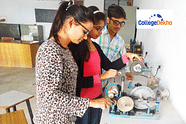List of Important Topics to study for NEET PG 2025 consists of topics like Nutrition, General Pharmacology, Cataracts, Chemotherapy, Immunopathology, Mycology, Allergic Disorders and so on.

List of Important Topics to study for NEET PG includes topics like gastrointestinal tract, neoplasia, enzymes – classification, isozymes and kinetics, etc. Further, the most important topics for NEET PG 2025 consist of various topics like the kidney, CVS, CNS, Forensic toxicology, and so on. The high-yield topics for the NEET PG exam are of high weightage, and studying these topics will help students in getting good marks. Students must diligently study important topics, as there are very high chances of questions being asked in the exam from these topics. A deep understanding of the important topics in the NEET PG syllabus helps students to formulate the most effective study plan for the exam. They will be able to set a customised timetable and target the weaker sections by utilising the right study techniques. In this article, know in detail about the important topics for NEET PG 2025, high-yield topics for the NEET PG weighage and more.
High-Yield Topics for NEET PG 2025
Respiratory system, nerve supply, cranial nerves and nuclei are among some of the important topics for NEET PG examinations. Students can find the list of detailed list of NEET PG important topics tabulated below.
Subjects | Most Important Topics for NEET PG 2025 |
|---|---|
Physiology |
|
Anatomy |
|
Biochemistry |
|
Pathology |
|
Pharmacology |
|
Microbiology |
|
Forensic Medicine |
|
Preventive and Social Medicine |
|
General Medicine |
|
Obstetrics and Gynaecology |
|
Paediatrics |
|
ENT |
|
Ophthalmology | Conjunctiva and cornea
|
Important Topics for NEET PG 2025 Subject-Wise Weightage
The NEET PG exam consists of clinical, para-clinical and pre-clinical subjects whose weightage varies based on the subjects. Students can find the detailed NEET PG important topics PDF on the official website of the NTA examinations. Below given is the NEET PG important topics subject-wise weightage for the NEET PG exam.Subject Parts | Subjects | Weightage (%) |
|---|---|---|
Pre-Clinical Subjects [Part A] | Anatomy | 17 |
Physiology | 17 | |
Biochemistry | 17 | |
Para-Clinical Subjects [Part B] | Pharmacology | 20 |
Pathology | 24 | |
Microbiology | 20 | |
Forensic Medicine | 10 | |
Social and Preventive Medicine | 25 | |
Clinical Subjects [Part C] | General Medicine – Dermatology, Venereology, Psychiatry | 45 |
General Surgery – Orthopedics, Anesthesia, Radiology | 45 | |
Obstetrics and Gynaecology | 30 | |
Pediatrics | 10 | |
Ophthalmology | 10 | |
ENT | 10 |
Therefore, this was all about the high-yield topics for NEET PG 2025. They can use study techniques like the 3r Rule, 20/80 methods, and Promodoro techniques rules to get good marks in the NEET PG exam. Further, students must practice from the mock papers, question banks, and sample papers to improve their performance while understanding their mistakes. For any queries regarding the List of Important Topics to Study for NEET PG 2025, log on to our CollegeDekho Q&A Zone or contact our toll-free helpline number 18005729877.
Are you feeling lost and unsure about what career path to take after completing 12th standard?
Say goodbye to confusion and hello to a bright future!

FAQs
The NEET PG important topics for the Biochemistry subjects include topics like Glycolysis, ETC, Lipoproteins, Genetics, DNA replication, etc.
Among the high-yield topics for NEET PG 2025, General medicine & general surgery consists for most of the weightage. This topic alone contributes to 45% questions in the exam paper.
Was this article helpful?


















Similar Articles
List of Private Medical Colleges in UP with Expected NEET Cutoff Ranks 2025
Cheapest MBBS Colleges in Maharashtra Accepting NEET 2025
List of Medical Colleges for 500-600 Marks in NEET UG 2025
Uttarakhand NEET Counselling Process 2025 (Soon): Dates, Registration, Seat Matrix, Fees
What is a Good Score in NEET 2025?
NEET Passing Marks 2025: Check Expected Cutoff & Previous Years' Trends